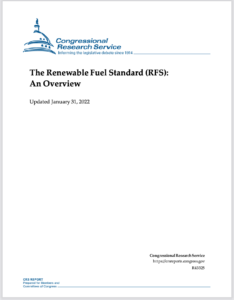Full Title: The Renewable Fuel Standard (RFS): An Overview
Author(s): Kelsi Bracmort
Publisher(s): Congressional Research Service (CRS)
Publication Date: January 31, 2022
Full Text: Download Resource
Description (excerpt):
Established by Congress as an amendment to the Clean Air Act, the Renewable Fuel Standard (RFS) mandates that U.S. transportation fuels contain a minimum volume of renewable fuel. The mandated minimum volume increases annually and generally has been met using both conventional biofuel (e.g., corn starch ethanol) and advanced biofuel (e.g., cellulosic ethanol). For a renewable fuel to be applied toward the mandate, it must be used for certain purposes (i.e.,road transportation fuel, jet fuel, or heating oil) and meet certain environmental and biomass feedstock criteria.
Challenges to implementing the RFS have led to scrutiny of the program in Congress and to litigation about EPA’s regulations. Largely due to concerns about the implementation and feasibility of the RFS, some Members of Congress have expressed their perspectives on EPA’s rulemakings as well as EPA’s implementation of the program. They also have questioned whether to amend or repeal the RFS or whether to maintain the status quo. This report provides an overview of the RFS, including some of the widely discussed policy issues related to it.
